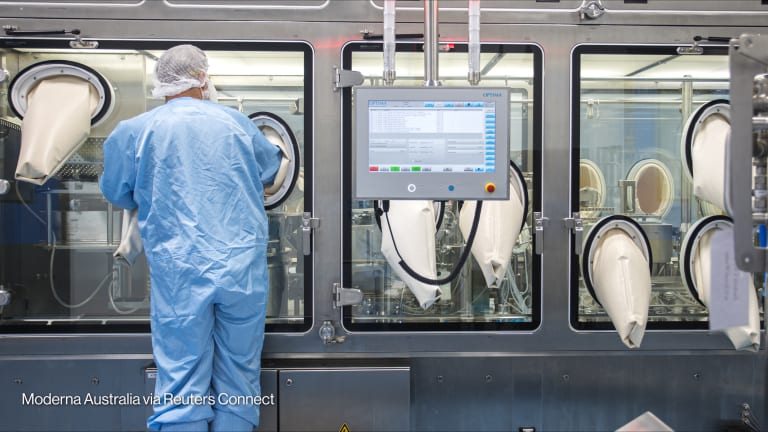AstraZeneca eyes donations to fill vaccine supply gap amid India demand

AstraZeneca is trying to tap into its various manufacturing sites to fill gaps in vaccine supply to COVAX and other countries relying on the Serum Institute of India, which has halted exports of COVID-19 vaccines. But it is difficult as the pharmaceutical company’s supply chains are already “very stretched,” said CEO Pascal Soriot.
Sign up for Devex CheckUp
The must-read weekly newsletter for exclusive global health news and insider insights.
“The good news is our vaccine is making a big difference in India. But of course [the] not so good news is we are short in supply to COVAX and the other countries,” he said in an interview in a Devex event on the sidelines of the 74th World Health Assembly.
AstraZeneca has delivered over 450 million doses of its vaccine to over 160 countries. Soriot is hoping vaccine donations from countries would help “bridge” the supply shortages.
“Because at some point, India will be able to restart exporting, and our own supply chains around the world will start kicking in and ramping up. It’s a question of bridging between now and then,” he said.
Why it matters: The government of India put a temporary hold on major exports of COVID-19 vaccines in March amid a deadly surge in COVID-19 infections in India. This has affected vaccine supplies to COVAX and other countries. SII is a major supplier of AstraZeneca COVID-19 vaccines to the global procurement mechanism.
There were initial hopes that the export hold would be short-lived. But last week, SII CEO Adar Poonawalla released a statement saying SII would continue to prioritize supply to India and may only be able to start delivering doses again to COVAX and other countries by the end of 2021.
Soriot said AstraZeneca has done technology transfers and currently has 25 manufacturing sites around the world. But “could not go beyond that.” He said its priority right now is improving site productivity and output.
“We've had issues with yield, which is the number of doses of vaccines you get out of one liter of product in the bioreactors. And the key for us is to really increase the yield so we can get more out of a bioreactor,” Soriot said.
In addition, Soriot said the company has already talked to all the large manufacturers globally, and even if there were other manufacturers available, AstraZeneca would not have the capacity to deploy engineers to help in technology transfer.
“Our engineers are working 24/7 on trying to improve the output, the yield, the productivity of the ongoing sites,” he said.
In terms of the next phase for the company, AstraZeneca has not yet decided whether it’s going to become a player in the vaccine business. Soriot said the focus at the moment is delivering its vaccines to “as many people as possible” globally.
But he said a key lesson from the crisis is that vaccines are not just a scientific challenge, but also an industrial one. There are very few vaccines now in development compared with a year ago, when there were over 100 vaccines in development across different parts of the world, he added.
“Of course, some haven't worked for scientific reasons, but mostly the issue has been capacity, manufacturing, scale. So I think for the future, it's really a question of scale,” Soriot said.
The company has established supply chains in different regions, such as Latin America, South Asia, East Asia, and Europe, as well as the United States. The key question for the future is how the world can set up capacity that can be rapidly utilized to boost manufacturing in a crisis, which Soriot said isn’t so easy to do.
“We all hope we won't have another pandemic like this for a long time. … [But if the world doesn’t] have one for a long time, then in the meantime what do we do with this idle capacity that someone has to pay for? And so this is one of the things that I guess governments and organizations around the world will have to think through. How do we maintain a capacity that can be tapped into very quickly to scale up manufacturing?” he said.
Update, May 27, 2021: This article has been updated with more details from the interview.

Search for articles
Most Read
- 1
- 2
- 3
- 4
- 5








